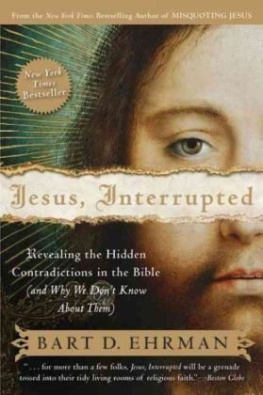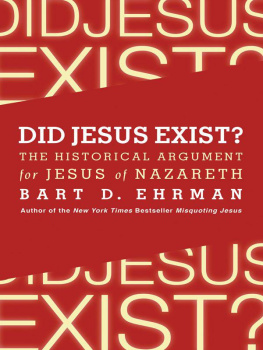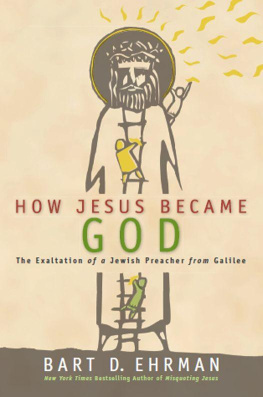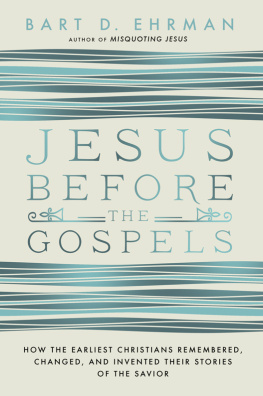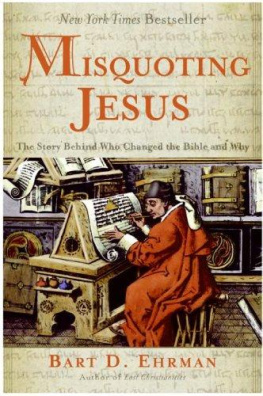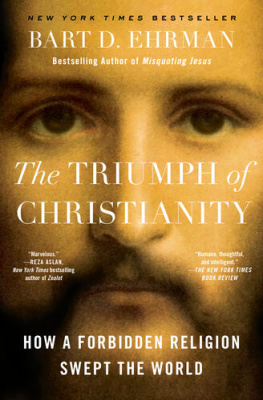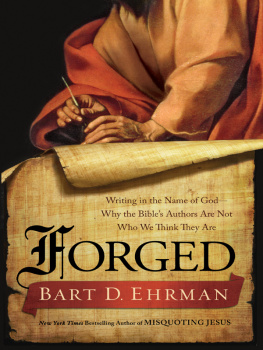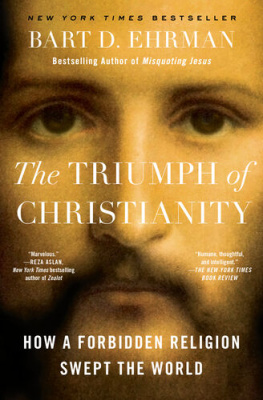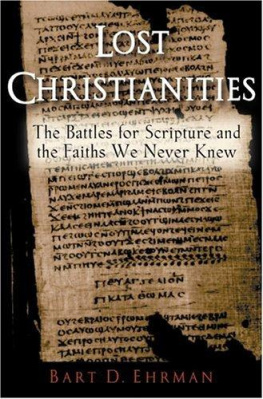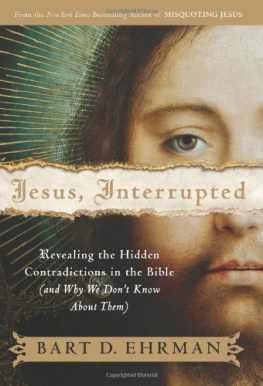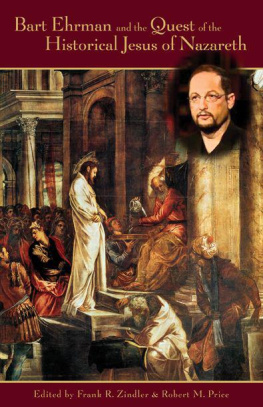BART D. EHRMAN is the author of more than twenty books, including the New York Times bestselling Misquoting Jesus and Gods Problem . Ehrman is the James A. Gray Distinguished Professor of Religious Studies at the University of North Carolina, Chapel Hill, and is a leading authority on the Bible and the life of Jesus. He has been featured in Time magazine and has appeared on NBCs Dateline, The Daily Show with Jon Stewart , CNN, The History Channel, major NPR shows, and other top media outlets. He lives in Durham, North Carolina. Visit the author online at www.bartdehrman.com.
Visit www.AuthorTracker.com for exclusive information on your favorite HarperCollins author.
HarperCollins Publishers (Australia) Pty. Ltd.
P.O. Box 1
HarperCollins Publishers Ltd.
HarperCollins Publishers Inc.
A Historical Assault on Faith
T he Bible is the most widely purchased, extensively read, and deeply revered book in the history of Western Civilization. Arguably it is also the most thoroughly misunderstood, especially by the lay reading public.
Scholars of the Bible have made significant progress in understanding the Bible over the past two hundred years, building on archaeological discoveries, advances in our knowledge of the ancient Hebrew and Greek languages in which the books of Scripture were originally written, and deep and penetrating historical, literary, and textual analyses. This is a massive scholarly endeavor. Thousands of scholars just in North America alone continue to do serious research in the field, and the results of their study are regularly and routinely taught, both to graduate students in universities and to prospective pastors attending seminaries in preparation for the ministry.
Yet such views of the Bible are virtually unknown among the population at large. In no small measure this is because those of us who spend our professional lives studying the Bible have not done a good job communicating this knowledge to the general public and because many pastors who learned this material in seminary have, for a variety of reasons, not shared it with their parishioners once they take up positions in the church. (Churches, of course, are the most obvious place where the Bible isor, rather, ought to betaught and discussed.) As a result, not only are most Americans (increasingly) ignorant of the contents of the Bible, but they are also almost completely in the dark about what scholars have been saying about the Bible for the past two centuries. This book is meant to help redress that problem. It could be seen as my attempt to let the cat out of the bag.
The perspectives that I present in the following chapters are not my own idiosyncratic views of the Bible. They are the views that have held sway for many, many years among the majority of serious critical scholars teaching in the universities and seminaries of North America and Europe, even if they have not been effectively communicated to the population at large, let alone among people of faith who revere the Bible and who would be, presumably, the ones most interested. For all those who aspire to being well educated, knowledgeable, and informed about our civilizations most important book, that has to change.
A SEMINARIANS INTRODUCTION TO THE BIBLE
Most of the people who are trained in Bible scholarship have been educated in theological institutions. Of course, a wide range of students head off to seminaries every year. Many of them have been involved with Bible studies through their school years, even dating back to their childhood Sunday School classes. But they have typically approached the Bible from a devotional point of view, reading it for what it can tell them about what to believe and how to live their lives. As a rule, such students have not been interested in or exposed to what scholars have discovered about the difficulties of the Bible when it is studied from a more academic, historical perspective.
Other students are serious about doing well academically in seminary but do not seem to know the Bible very well or to hold particularly high views of Scripture as the inspired Word of God. These students are often believers born and raised, who feel called to ministrymost of them to ministry in the church, but a good number of them to other kinds of social ministry. For the countrys mainline denominationsPresbyterian, Methodist, Lutheran, Episcopalian, and so ona good number of these students are already what I would call liberal. They do not believe in the inerrancy of the Bible and are more committed to the church as an institution than to Scripture as a blueprint for what to believe and how to live ones life. And many of them, frankly, dont know very much about the Bible and have only a kind of vague sense of its religious value.
It was not always like this in Protestant seminaries. In earlier decades it could be assumed that a student would arrive at seminary with a vast knowledge of the Bible, and the training for ministry could presuppose that students had at their command the basic contents of both Old and New Testaments. That, sadly, is no longer the case. When I was at Princeton Theological Seminary (a Presbyterian school) in the late 1970s, most of my classmates were required to take remedial work in order to pass an exam that we called the baby Bible exam, a test of a students knowledge about the most basic information about the BibleWhat is the Pentateuch? In what book is the Sermon on the Mount found? Who is Theophilus?information that most of us from stronger evangelical backgrounds already had under our belts.
My hunch is that the majority of students coming into their first year of seminary training do not know what to expect from courses on the Bible. These classes are only a small part of the curriculum, of course. There are required courses in church history, systematic theology, Christian education, speech, homiletics (preaching), and church administration. Its a lot to squeeze into three years. But everyone is required to take introductory and advanced courses in biblical studies. Most students expect these courses to be taught from a more or less pious perspective, showing them how, as future pastors, to take the Bible and make it applicable to peoples lives in their weekly sermons.
Such students are in for a rude awakening. Mainline Protestant seminaries in this country are notorious for challenging students cherished beliefs about the Bibleeven if these cherished beliefs are simply a warm and fuzzy sense that the Bible is a wonderful guide to faith and practice, to be treated with reverence and piety. These seminaries teach serious, hard-core Bible scholarship. They dont pander to piety. They are taught by scholars who are familiar with what German-and English-speaking scholarship has been saying about the Bible over the past three hundred years. They are keen to make students knowledgeable about the Bible, rather than teach what is actually in the Bible. Bible classes in seminary are usually taught from a purely academic, historical perspective, unlike anything most first-year students expect and unlike anything theyve heard before, at home, at church, or in Sunday School.

